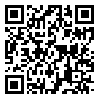Volume 9, Issue 4 (10-2024)
CJHR 2024, 9(4): 237-248 |
Back to browse issues page
Download citation:
BibTeX | RIS | EndNote | Medlars | ProCite | Reference Manager | RefWorks
Send citation to:



BibTeX | RIS | EndNote | Medlars | ProCite | Reference Manager | RefWorks
Send citation to:
Kasmaei P, Yousefi P, Farmanbar R, Omidi S, Karimy M, Bab Eghbal S, et al . The Impact of Health Belief Model-based Education on Self-care Behaviors of Hypertensive Patients. CJHR 2024; 9 (4) :237-248
URL: http://cjhr.gums.ac.ir/article-1-382-en.html
URL: http://cjhr.gums.ac.ir/article-1-382-en.html
Parisa Kasmaei1 
 , Pegah Yousefi2
, Pegah Yousefi2 
 , Rabiollah Farmanbar1
, Rabiollah Farmanbar1 
 , Saeed Omidi1
, Saeed Omidi1 
 , Mahmood Karimy3
, Mahmood Karimy3 
 , Sedighe Bab Eghbal *4
, Sedighe Bab Eghbal *4 
 , Maryam Shakiba5
, Maryam Shakiba5 
 , Morvarid Molaee6
, Morvarid Molaee6 


 , Pegah Yousefi2
, Pegah Yousefi2 
 , Rabiollah Farmanbar1
, Rabiollah Farmanbar1 
 , Saeed Omidi1
, Saeed Omidi1 
 , Mahmood Karimy3
, Mahmood Karimy3 
 , Sedighe Bab Eghbal *4
, Sedighe Bab Eghbal *4 
 , Maryam Shakiba5
, Maryam Shakiba5 
 , Morvarid Molaee6
, Morvarid Molaee6 

1- Department of Health Education and Promotion, Research Center of Health and Environment, Faculty of Health, Guilan University of Medical Sciences, Rasht, Iran.
2- Deputy of Health, Guilan University of Medical Sciences, Rasht, Iran.
3- Social Determinants of Health Research Center, Saveh University of Medical Sciences, Saveh, Iran.
4- Department of Obstetrics and Gynecology, Reproductive Health Research Center, Faculty of Medicine, Al-Zahra Hospital, Guilan University of Medical Sciences, Rasht, Iran. ,Sedigheh.eghbal@yahoo.com
5- Department of Biostatistics and Epidemiology, Faculty of Health, Guilan University of Medical Sciences, Rasht, Iran.
6- Department of Psychology, Faculty of Humanities, Rasht Branch, Islamic Azad University, Rasht, Iran.
2- Deputy of Health, Guilan University of Medical Sciences, Rasht, Iran.
3- Social Determinants of Health Research Center, Saveh University of Medical Sciences, Saveh, Iran.
4- Department of Obstetrics and Gynecology, Reproductive Health Research Center, Faculty of Medicine, Al-Zahra Hospital, Guilan University of Medical Sciences, Rasht, Iran. ,
5- Department of Biostatistics and Epidemiology, Faculty of Health, Guilan University of Medical Sciences, Rasht, Iran.
6- Department of Psychology, Faculty of Humanities, Rasht Branch, Islamic Azad University, Rasht, Iran.
Abstract: (1027 Views)
Background: Hypertension is a prevalent health problem worldwide, affecting numerous individuals aged 35 and above.
Objectives: This study aimed to assess the impact of a health belief model (HBM)-based educational intervention on self-care behaviors of hypertensive patients attending rural health centers in Rasht County, North of Iran.
Materials & Methods: In this quasi-experimental study, 96 hypertensive patients were selected through a multi-stage sampling method and randomly divided into experimental and control groups (48 samples per group). The data collection tool consisted of a valid questionnaire comprising four parts: Demographic variables, knowledge, HBM constructs, and self-care behaviors. The educational program was based on HBM and held during five 45-minute sessions per group (four 12-sample groups). The data was collected twice before and three months after the educational intervention.
Results: Before the educational intervention, mean scores for knowledge and HBM constructs, self-care, and blood pressure were equal and showed no statistically significant difference between the intervention and control groups (P>0.05). However, after three months of the educational intervention, the mean score of knowledge, self-care, and all HBM constructs, except for perceived barriers, increased significantly in the experimental group (P<0.05). Moreover, the patient’s mean blood pressure scores significantly decreased in the experimental group.
Conclusion: The substantial reduction in patients’ blood pressure levels indicated the success of the HBM-based intervention in enhancing self-care and blood pressure control in the target population. Therefore, an educational approach is recommended as an effective, cost-efficient, and safe solution in blood pressure control programs.
Objectives: This study aimed to assess the impact of a health belief model (HBM)-based educational intervention on self-care behaviors of hypertensive patients attending rural health centers in Rasht County, North of Iran.
Materials & Methods: In this quasi-experimental study, 96 hypertensive patients were selected through a multi-stage sampling method and randomly divided into experimental and control groups (48 samples per group). The data collection tool consisted of a valid questionnaire comprising four parts: Demographic variables, knowledge, HBM constructs, and self-care behaviors. The educational program was based on HBM and held during five 45-minute sessions per group (four 12-sample groups). The data was collected twice before and three months after the educational intervention.
Results: Before the educational intervention, mean scores for knowledge and HBM constructs, self-care, and blood pressure were equal and showed no statistically significant difference between the intervention and control groups (P>0.05). However, after three months of the educational intervention, the mean score of knowledge, self-care, and all HBM constructs, except for perceived barriers, increased significantly in the experimental group (P<0.05). Moreover, the patient’s mean blood pressure scores significantly decreased in the experimental group.
Conclusion: The substantial reduction in patients’ blood pressure levels indicated the success of the HBM-based intervention in enhancing self-care and blood pressure control in the target population. Therefore, an educational approach is recommended as an effective, cost-efficient, and safe solution in blood pressure control programs.
Article Type: Original Contributions |
Subject:
Health Education and Promotion
Received: 2024/05/17 | Accepted: 2024/07/20 | Published: 2024/10/1
Received: 2024/05/17 | Accepted: 2024/07/20 | Published: 2024/10/1
Send email to the article author
| Rights and permissions | |
 |
This work is licensed under a Creative Commons Attribution-NonCommercial 4.0 International License. |






